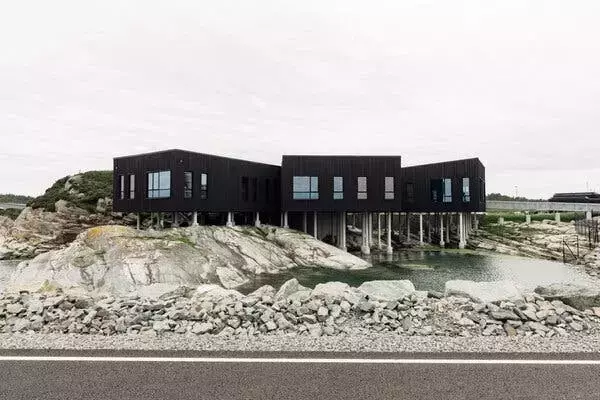
Norway is emerging as a pioneer in climate change mitigation, leveraging its rich petroleum expertise and geological advantages to establish a robust carbon capture and storage (CCS) industry. The Northern Lights project, a massive undertaking near Bergen, exemplifies this ambition, acting as a crucial component in Europe's broader strategy to combat industrial carbon emissions. This innovative venture not only promises environmental benefits by significantly reducing greenhouse gas output from hard-to-abate sectors like cement and fertilizer production, but also presents a compelling economic model for the future. With substantial governmental support and the involvement of major energy corporations, Northern Lights is poised to transform waste into a valuable commodity, offering a scalable and flexible solution for industries seeking to decarbonize their operations. The project's success is being closely watched globally as a potential blueprint for other nations grappling with similar environmental and economic challenges.
Furthermore, this endeavor signifies a strategic pivot for Norway, transitioning from a traditional fossil fuel economy to a leader in sustainable energy solutions. By transforming its oil and gas infrastructure into a carbon sequestration service, Norway is proactively securing its economic future in a world increasingly moving towards net-zero emissions. The financial incentives, coupled with advanced technological deployment and international collaboration, underscore a bold vision for a carbon-neutral industrial landscape. As Northern Lights expands its reach across the North Sea region, attracting more clients and refining its operational efficiencies, it highlights the immense potential of CCS as a profitable and environmentally critical industry. This initiative demonstrates that with the right investment, innovation, and policy framework, ambitious climate goals can be met while fostering new economic opportunities.
Pioneering Carbon Capture: The Northern Lights Initiative
Norway is spearheading a transformative carbon capture and storage (CCS) project, Northern Lights, poised to redefine industrial emissions management. Utilizing advanced technology, this initiative collects carbon dioxide from heavy industries and sequesters it deep beneath the North Sea. Backed by substantial government funding and strategic partnerships with energy giants like Shell, Equinor, and TotalEnergies, Northern Lights aims to establish a commercially viable, regional carbon disposal service, paving the way for a greener industrial future in Europe.
Situated on Norway's rugged west coast, the Northern Lights project features extensive facilities designed to process and store liquid carbon dioxide. This CO2, extracted from industrial exhaust streams such as those from cement and fertilizer plants, is transported by specialized vessels to the Oygarden terminal. From there, it is pumped approximately 70 miles offshore and more than 8,500 feet into porous rock formations beneath the North Sea, ensuring its secure and permanent containment. The project is a collaborative effort involving major energy companies, reflecting a shared commitment to developing sustainable solutions for emissions-intensive industries. It offers a flexible service, allowing various industrial facilities across Europe to offload their carbon emissions, thereby mitigating the impact of stringent environmental regulations and carbon taxes. This integrated approach, from capture and transport to storage, demonstrates a comprehensive strategy for managing industrial carbon footprints.
Economic Transition and Sustainable Development
Norway's carbon capture venture represents a strategic shift towards a sustainable economy, leveraging its existing petroleum infrastructure to create a new market for emissions disposal. This initiative not only addresses environmental concerns but also offers a viable business model, with potential profitability for its stakeholders, including the Norwegian government and partner energy companies.
This ambitious undertaking is fundamentally reshaping Norway's economic landscape, shifting its focus from traditional hydrocarbon extraction to pioneering carbon management services. The Norwegian government has invested approximately $3.3 billion, covering two-thirds of the project's initial costs and a decade of operations, signaling a strong national commitment to kick-starting the European CCS market. This substantial backing makes the project financially attractive to partners like Shell, Equinor, and TotalEnergies, which anticipate a roughly 10 percent profit margin. While carbon capture remains a nascent industry with high upfront costs, government subsidies are critical in bridging the financial gap, making large-scale projects feasible. For industries like cement manufacturing, which face significant carbon taxes, Northern Lights offers a cost-effective alternative to direct emissions, albeit at an increased product price for low-carbon alternatives. This strategic investment in a new, green industry positions Norway as a global leader in environmental innovation, demonstrating a pathway for other nations to monetize carbon reduction efforts while meeting climate targets.
